Workshop to launch drafting of good practice guide for leafy vegetables in Togo
- 19/07/2021
- Posted by: Sandra Borma
- Category: News, Togo
No Comments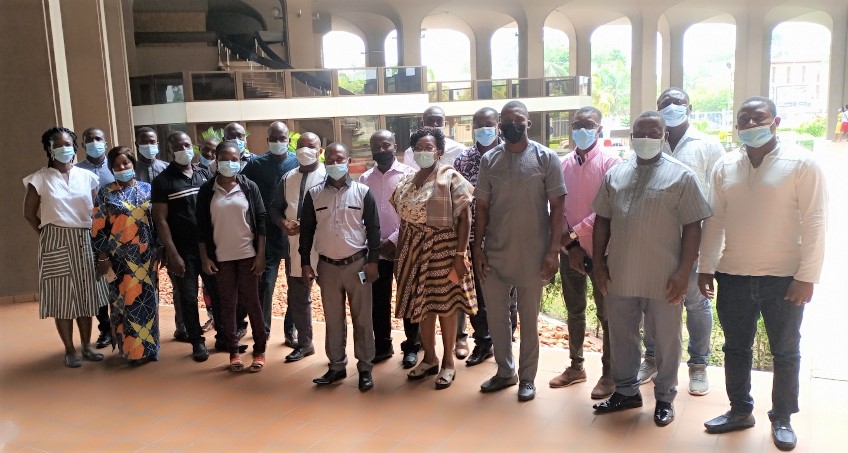 On 9 July, a launch workshop was organised in the framework of the drafting of a sectoral guide of good practices for the leafy vegetable value chain in Togo. This meeting, which brought together about 50 participants from different organisations (APROTELF, DPV, DFV, ICAT, ITRA, FENOMAT, companies), aimed on the one hand to raise awareness among stakeholders on the objectives and interest of a guide for the leafy vegetable sector in Togo; and on the other hand, to present the… +
On 9 July, a launch workshop was organised in the framework of the drafting of a sectoral guide of good practices for the leafy vegetable value chain in Togo. This meeting, which brought together about 50 participants from different organisations (APROTELF, DPV, DFV, ICAT, ITRA, FENOMAT, companies), aimed on the one hand to raise awareness among stakeholders on the objectives and interest of a guide for the leafy vegetable sector in Togo; and on the other hand, to present the… +Cameroon: Group training on safe use of pesticides in the Loum basin
- 16/07/2021
- Posted by: Sandra Borma
- Category: Cameroon, News
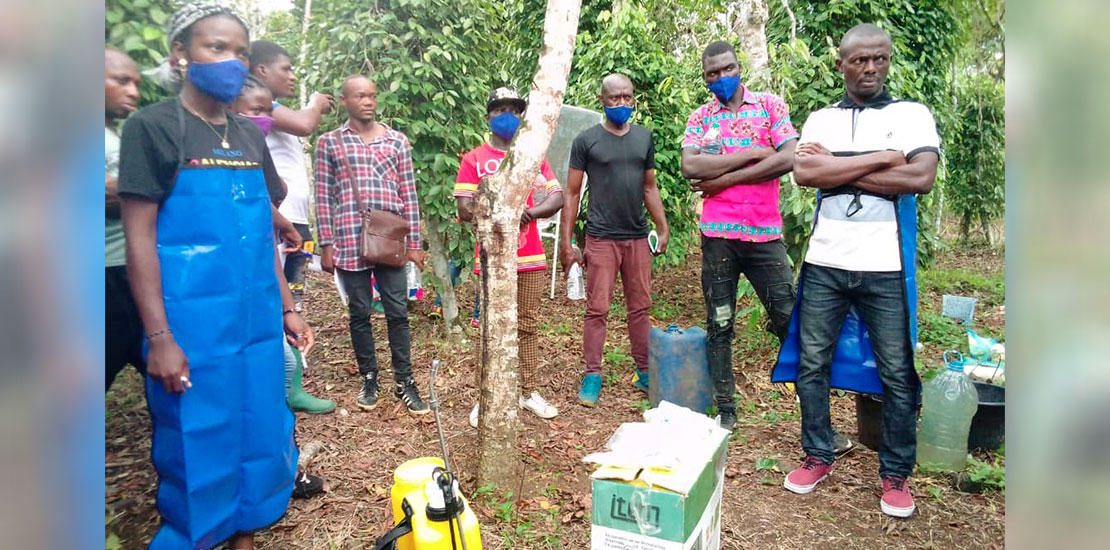 On 14 and 15 July, COLEACP organised group training on the “Safe Use of Pesticides” for plant protection product applicators in the Loum basin. This training is part of the Standards and Trade Development Fund (STDF) project “Improvement of the sanitary and phytosanitary quality of Penja pepper in Cameroon to facilitate access to international markets” (STDF/PG/593). Following this training, the participants are now able to carry out treatments according to good phytosanitary practices and to carry out the instructions: during… +
On 14 and 15 July, COLEACP organised group training on the “Safe Use of Pesticides” for plant protection product applicators in the Loum basin. This training is part of the Standards and Trade Development Fund (STDF) project “Improvement of the sanitary and phytosanitary quality of Penja pepper in Cameroon to facilitate access to international markets” (STDF/PG/593). Following this training, the participants are now able to carry out treatments according to good phytosanitary practices and to carry out the instructions: during… +Côte d’Ivoire Delegation and COLEACP meeting in Brussels
- 15/07/2021
- Posted by: Sandra Borma
- Category: Côte d'Ivoire, News
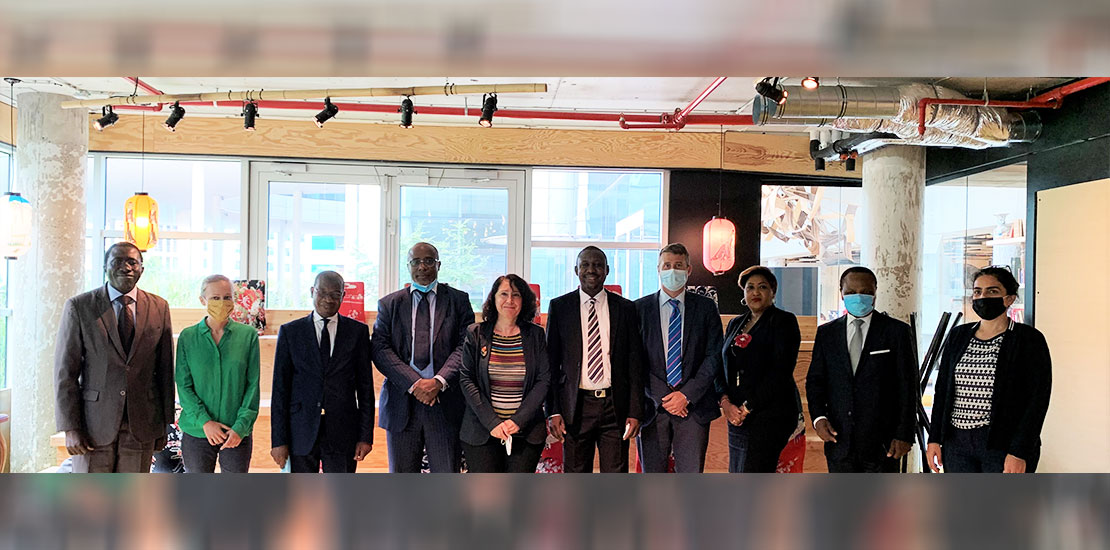 On 12 July, a working meeting between the Côte d’Ivoire Delegation and COLEACP gave the association the opportunity to present its activities and priorities related to the agriculture and agri-food sector in Côte d’Ivoire, a key partner country for COLEACP, and to discuss its support to the planned EU-West Africa (EU-WA) business forum. COLEACP was represented by Jeremy Knops, General Delegate; Nursel Gumusboga, Regional Programme Manager; and Isolina Boto, Head of Networks and Alliances. Composed of representatives of Côte d’Ivoire… +
On 12 July, a working meeting between the Côte d’Ivoire Delegation and COLEACP gave the association the opportunity to present its activities and priorities related to the agriculture and agri-food sector in Côte d’Ivoire, a key partner country for COLEACP, and to discuss its support to the planned EU-West Africa (EU-WA) business forum. COLEACP was represented by Jeremy Knops, General Delegate; Nursel Gumusboga, Regional Programme Manager; and Isolina Boto, Head of Networks and Alliances. Composed of representatives of Côte d’Ivoire… +Disseminating R-SAT – COLEACP’s Rapid SPS Assessment Tool
- 27/05/2021
- Posted by: Gaetan Dermien
- Category: Cameroon, Côte d'Ivoire, Senegal, Suriname, Uganda, Zimbabwe
 Competent authorities of six priority countries On 22 and 29 April, COLEACP’s new Rapid SPS Assessment Tool (R-SAT) was presented in English and French to competent authorities of the six priority countries where it will soon be applied: Suriname, Uganda and Zimbabwe; Cameroon, Côte d’Ivoire and Senegal. A presentation of the tool was followed by discussions. The planning for its implementation in the six pilot countries will be discussed with each country individually, including selection of the value chain that… +
Competent authorities of six priority countries On 22 and 29 April, COLEACP’s new Rapid SPS Assessment Tool (R-SAT) was presented in English and French to competent authorities of the six priority countries where it will soon be applied: Suriname, Uganda and Zimbabwe; Cameroon, Côte d’Ivoire and Senegal. A presentation of the tool was followed by discussions. The planning for its implementation in the six pilot countries will be discussed with each country individually, including selection of the value chain that… +Training in the new Rapid SPS Assessment Tool (R-SAT)
- 17/03/2021
- Posted by: Gaetan Dermien
- Category: Africa, Caribbean, News, Pacific
 Two online R-SAT training sessions took place in February and early March, each for nine experts – in English for participants from the Caribbean Agricultural Health and Food Safety Agency (CAHFSA), the Dominican Republic, Ghana, Kenya, Nigeria, Uganda and Zimbabwe; and in French for experts from Cameroon, Benin, Burkina Faso, Burundi, Côte d’Ivoire, Guinea, Madagascar, Senegal and Togo. Experts’ feedback will inform the final version of the tool, and the training will be followed by the use of R-SAT in… +
Two online R-SAT training sessions took place in February and early March, each for nine experts – in English for participants from the Caribbean Agricultural Health and Food Safety Agency (CAHFSA), the Dominican Republic, Ghana, Kenya, Nigeria, Uganda and Zimbabwe; and in French for experts from Cameroon, Benin, Burkina Faso, Burundi, Côte d’Ivoire, Guinea, Madagascar, Senegal and Togo. Experts’ feedback will inform the final version of the tool, and the training will be followed by the use of R-SAT in… +APROTELF workshop
- 15/03/2021
- Posted by: Sandra Borma
- Category: News, Togo
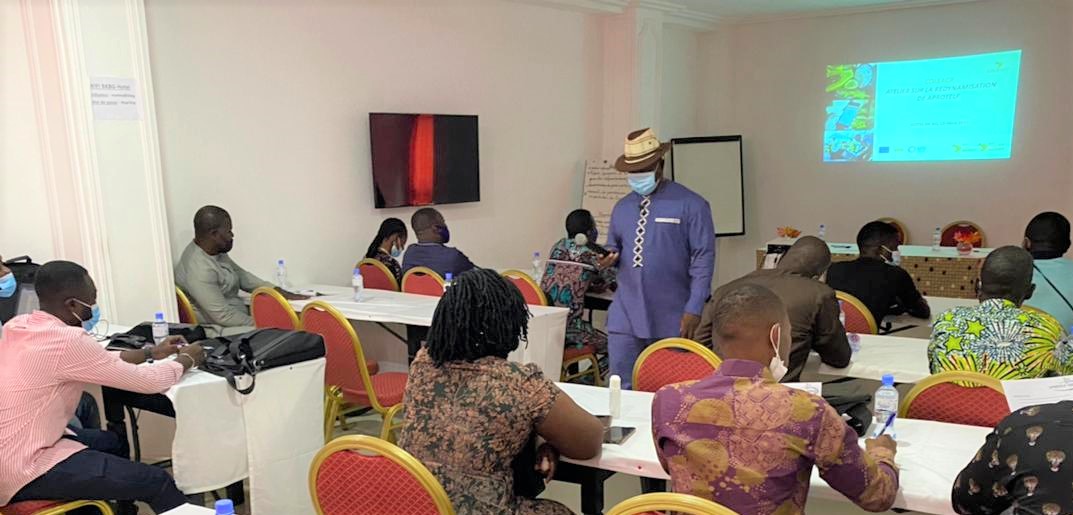 A workshop of the Association of Producers, Processors and Exporters of Vegetables and Fruits of Togo (APROTELF), with about 30 participants, was held on 15 March in Lomé. This workshop, which was part of the revitalisation of APROTELF, aimed to learn about the needs and expectations of companies. Participants discussed the actions needed to support the association to offer appropriate and useful services to its members, while working effectively to promote and defend the interests of the fruit and vegetable… +
A workshop of the Association of Producers, Processors and Exporters of Vegetables and Fruits of Togo (APROTELF), with about 30 participants, was held on 15 March in Lomé. This workshop, which was part of the revitalisation of APROTELF, aimed to learn about the needs and expectations of companies. Participants discussed the actions needed to support the association to offer appropriate and useful services to its members, while working effectively to promote and defend the interests of the fruit and vegetable… +New COLEACP Rapid SPS Assessment Tool – promoting dialogue and engagement
- 09/02/2021
- Posted by: Gaetan Dermien
- Category: Africa, Caribbean, Pacific
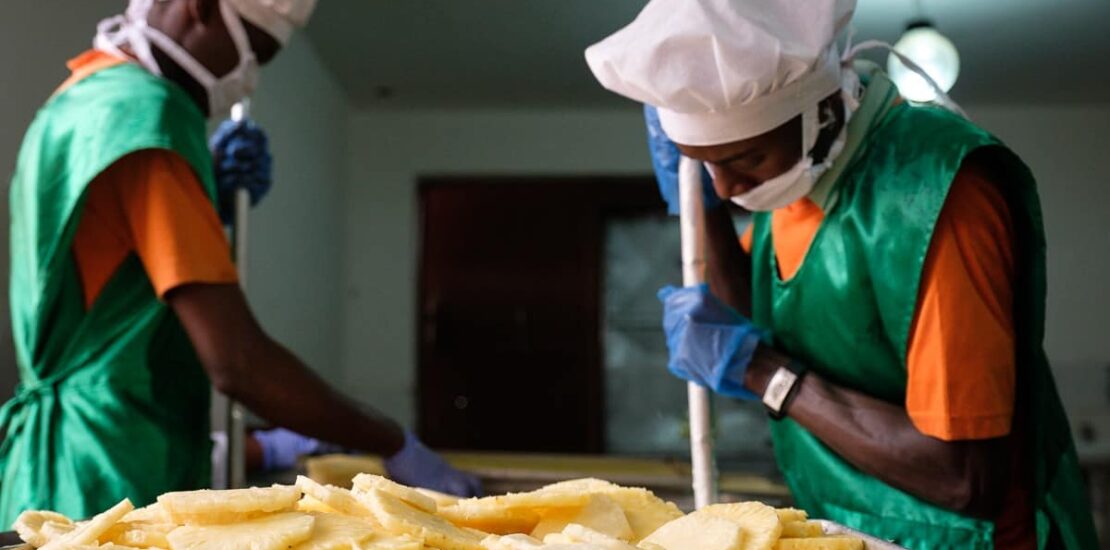 COLEACP’s new Rapid SPS Assessment Tool (R-SAT) provides an integrative change management model to help competent authorities in ACP countries assess their national sanitary and phytosanitary (SPS) systems. At the heart of the model is the facilitation of dialogue and engagement between the key stakeholders, both public and private. In the final stage of developing R-SAT, online training sessions are taking place with SPS experts: one in English in the second half of February, and one in French in the… +
COLEACP’s new Rapid SPS Assessment Tool (R-SAT) provides an integrative change management model to help competent authorities in ACP countries assess their national sanitary and phytosanitary (SPS) systems. At the heart of the model is the facilitation of dialogue and engagement between the key stakeholders, both public and private. In the final stage of developing R-SAT, online training sessions are taking place with SPS experts: one in English in the second half of February, and one in French in the… +STDF Cameroon: Support to Penja Pepper GI staff
- 21/10/2020
- Posted by: Emmanuel Bourcelet
- Category: Cameroon, Pepper
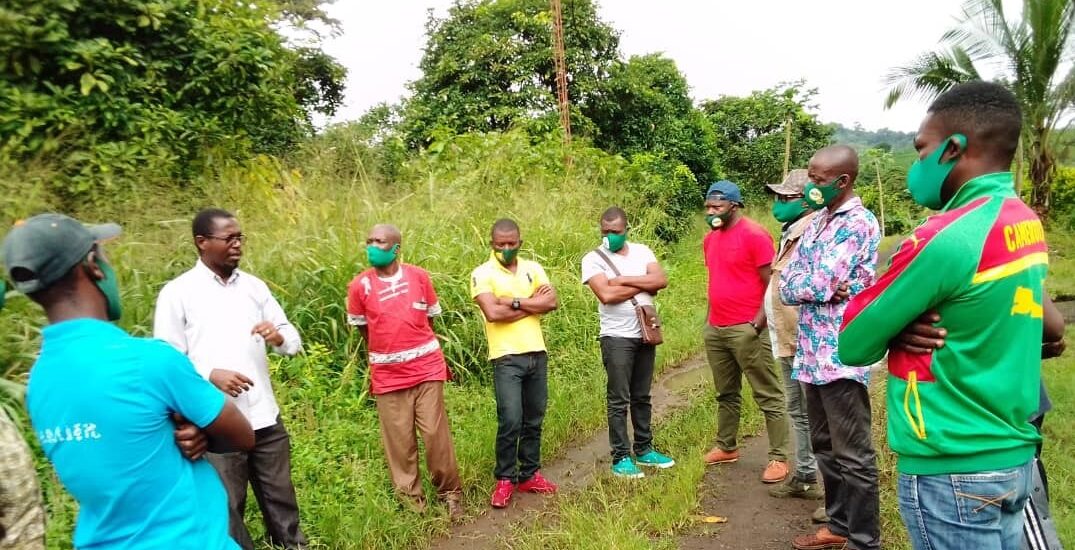 A mission is under way in Penja to support staff of the Penja Pepper Geographical Indication (GI) to create a database of all the main actors in the pepper production and distribution chain in the five production basins of the GI, as well as a census of these stakeholders in the field. This mission is part of the STDF/PG/593 project, which aims to contribute to improving the sanitary and phytosanitary quality of Penja pepper to facilitate its access to markets,… +
A mission is under way in Penja to support staff of the Penja Pepper Geographical Indication (GI) to create a database of all the main actors in the pepper production and distribution chain in the five production basins of the GI, as well as a census of these stakeholders in the field. This mission is part of the STDF/PG/593 project, which aims to contribute to improving the sanitary and phytosanitary quality of Penja pepper to facilitate its access to markets,… +
